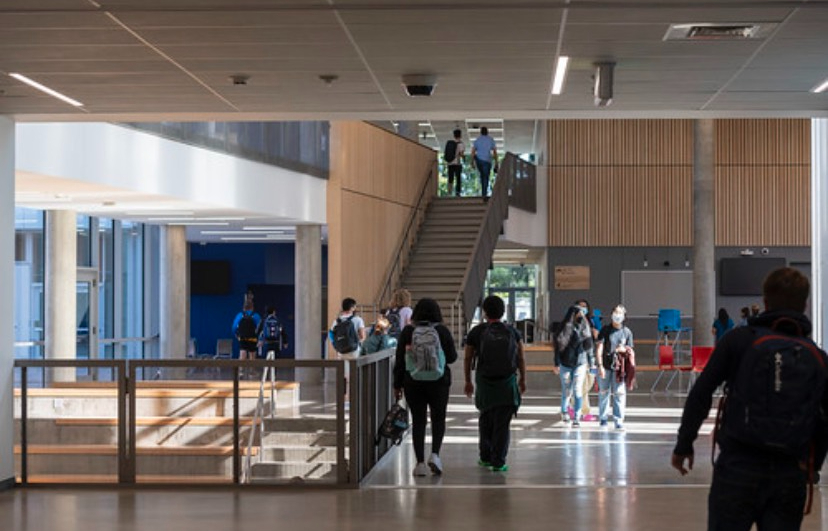Editorial: While progressing, PPS still too staunch, must enact teacher’s union’s original proposal of full-day Flex to lift pressure on students, teachers
Editor’s Note: The decision to create an editorial piece regarding the contract negotiations between PPS and PAT–opposed to a standard opinion piece–was made by the entire staff at McDaniel News being that this possible change in school schedule will without a doubt impact the student body.
The editorial board recognizes the shifts and adjustments to proposals that both bargaining sides put forward, yet still agrees the student voice must be considered.
Throughout the process of creating this piece, the editorial board has had to come back to the table numerous times to collaborate and come to consensus, being that there have been many proposals throughout negotiations, both weekly and daily.
It is crucial that Portland Public Schools (PPS) adopt the original Nov. 29 proposal put forward by the Portland Association of Teachers (PAT) to replace eight-period days with an all-day Flex day. It is no secret that teachers and students are at a breaking point, and the district’s refusal to adopt substantive changes will only continue to put more stress on everyone involved in the education system.
The union’s proposal is first and foremost designed to help teachers, counselors and instructional coaches. On top of the all-day Flex, the proposal includes eliminating non-essential staff committees, additional planning days at the ends of quarters and fewer staff meetings. Coverage about how this will impact students has been limited, frequently only used as a way to condemn the proposal. The district has used the needs of students, such as for instructional time and improved grades, to justify its unwillingness to accept the plan, ignoring the reality that it is also a necessary step—at least temporarily—to provide aid to students desperately in need.
The union has, in light of the district’s refusal to accept the original proposal, attempted to craft a new proposal which is more palatable to district negotiators. In it, the union pitched the idea of having Flex two days a week either after the first period of the day or before the last. This new proposal is woefully inadequate for both teachers and students, and now even going as far as to have flex, and now even going as far as to have flex reduced to two periods spread across two days each week. Even the union’s own negotiators have acknowledged that this is not what they want, this is just all that the district will accept.
PPS Deputy Superintendent Shawn Bird shared distressing data during a PAT and PPS bargaining session, which showed the school system is not properly supporting many students; chronic absence and poor grades are common. There is an increased number of drug and alcohol use incidents. There have been more than twice as many suicide screenings in the first quarter of this school year than in the first quarter of the 2019-2020 school year, as well as an increase in Title IX reports compared with two years ago.
Several factors have contributed to this. No doubt many students are falling behind in school because the 18 months of being online proved ineffective at advancing academic development. The jump directly from online school to full-time in-person learning with very little done to smooth the transition has certainly not helped. Both the district and the union agree that many students expressed that they feel overwhelmed by the sudden return to a highly social environment and the stark workload increase. We have seen that here in our building, which is why we are taking such a strong stance on this issue.
Where the rift between PPS and the PAT lies is in their solutions to this problem. Over the roughly two weeks since the first bargaining meeting, the district has gradually accepted some of the smaller aspects of the union’s proposal, including fewer staff meetings and three modified days in which students focus on individual coaching with teachers. On Dec. 16, the district also proposed mandatory weekly Flex time between periods 3/4 and 7/8. These are insubstantial changes that fail to address the massive scope of the crisis our academic system is under. PPS’s outright rejection of the larger aspects of the union’s proposal seems to suggest they do not truly grasp the magnitude of the strains both students and teachers are under.
The plan is not a full solution because it still fails to solve the problem for teachers who need additional planning time. Many teachers will have little to no planning time during these added Flex periods, as they will still be facilitating students’ learning in their rooms.
The full-day Flex proposed by the union better addresses this problem because it allocates half of the day for teachers to plan. Obviously this is necessary for teachers and their well-being, but it is also important for students. Teachers having more time to plan and grade would allow them to better focus on their students during class.
The overall lack of district action shows a profound disconnect between them and the people they are supposed to be helping. The district’s acknowledgement of the extremely troublesome data coming from its own schools combined with unwillingness to take action is worrisome. It would be one thing if they disagreed with the PAT’s proposal because they believed they had a better solution, but they do not. Some reduced staff meetings and a few extra planning days is not enough to fix these drastic problems.
The district and opponents of the proposal cite the same statistics as mentioned previously, saying that kids need all the time in class they can get right now; they allege that by removing skinny days and replacing it with a full day of Flex we are abandoning students who are most in need. What they are missing is that the proposal is not merely a day off for all students, rather it is a day for students to utilize however they feel is necessary for their education, whether that be checking in with teachers, doing work they may otherwise not have time for, or taking time to address individual mental health.
McDaniel students we interviewed have said they would use their time for as much. Almost every student who was spoken to by our editorial board said they support the proposal, citing the stress of being back in school, the long hours, and the need for individual coaching with teachers. Most supporters said they would utilize the day for something which furthers their academic success over simply taking a three-day weekend. The bulk of those who said they wouldn’t always that day are already succeeding and do not need the additional time, so they would just take the day off. One stated that they would simply stay home to rest.
The district must act now and enact policies that will alleviate the immense pressure currently placed on students and teachers. If done, they will signal to all Portlanders that they are serious about assisting students and educators in need and set a precedent for school boards across the country about how to handle this national crisis. If PPS chooses to remain on their current course and fails to take action, they will continue to irreparably hurt students, teachers and the education system at large.
For further developments, all negotiations between the district and union are uploaded to the PAT’s youtube.








